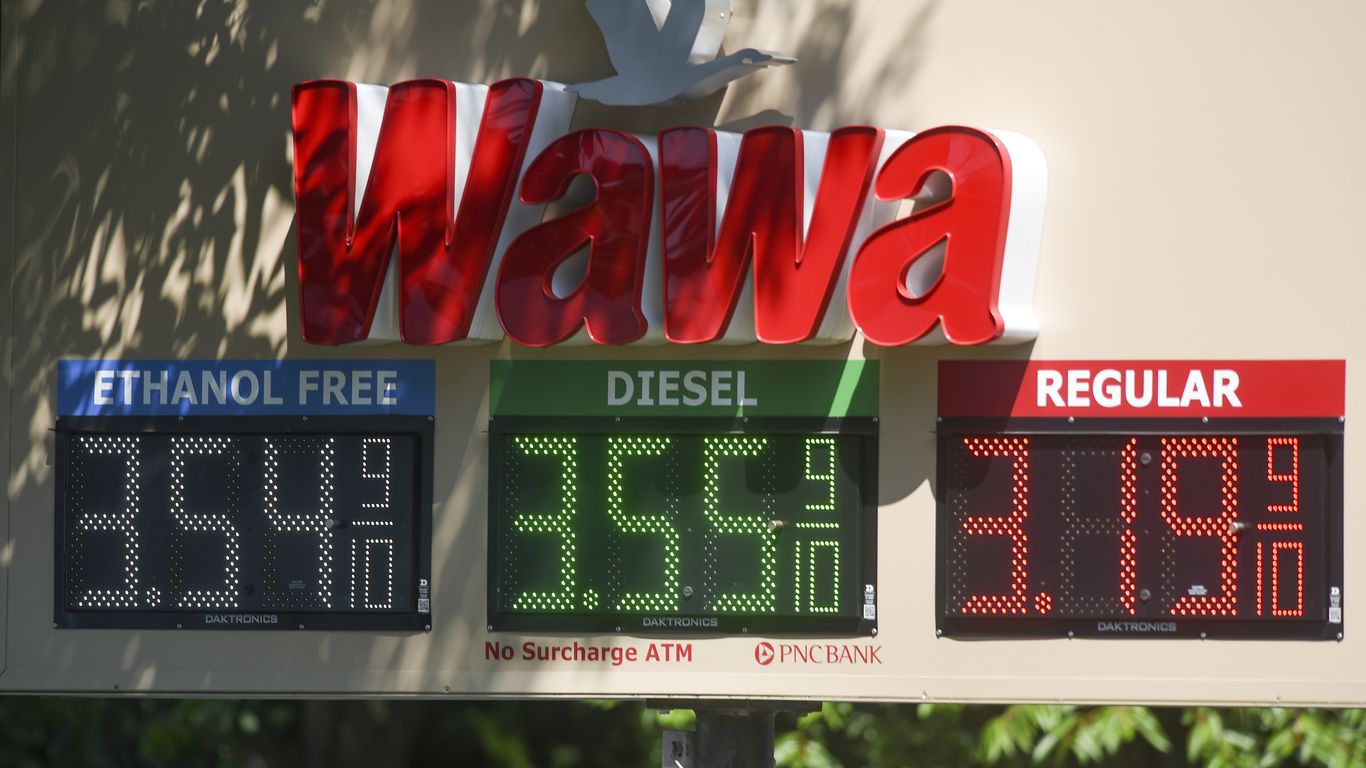
The Biden White House increasingly views rising gasoline prices as a source of potential political peril — and is now asking some of the world's biggest oil producers to pump more oil.
Why it matters: This trend, combined with a fragile economic recovery threatened by the Delta variant of the coronavirus, and inflation beginning to bite consumers, could threaten the administration's ambitious congressional agenda for late summer and early fall.
Driving the news: The administration made two revealing moves on gas prices Tuesday morning.
- One was to instruct the Federal Trade Commission to investigate "market manipulation or anti-competitive practices" influencing the retail price of gasoline.
- The other was the issuance of a memo from national security adviser Jake Sullivan, criticizing the recent decision from OPEC+ countries to increase production by 400,000 barrels a day monthly through December as "simply not enough" to avoid putting the international economic recovery at risk.
The big picture: Urging OPEC+ to produce more crude oil is, at least on the surface, incongruent with Biden's climate agenda of moving the country away from a dependence on fossil fuels. It was also a particularly dissonant move coming just two days after the U.N. IPCC issued its starkest warnings yet of the repercussions of human-caused global warming.
Between the lines: The FTC letter and Sullivan memo came the same day that the White House National Climate Task Force met to discuss the IPCC report and overall progress on the president's agenda to reduce greenhouse gas emissions and improve climate resilience.
By the numbers: Gas prices have been on the rise, from $2.24 per gallon in January to $3.172 as of Aug. 9, according to the EIA.
What they're saying: A White House official told Axios that the administration can simultaneously push forward its ambitious climate agenda while being "vigilant" that middle class families don't suffer from a temporary surge in gas prices as the economy climbs out of its pandemic recession.
- The official said that while current gas prices are within the range seen in recent years, the crude oil prices have climbed higher than pre-pandemic levels.
The big picture: According to Bob McNally, founder and president of Rapidan Energy Group, who served on the National Security Council during the George W. Bush administration, Biden's team is acting due to increased concerns over inflation — but not just among the public.
- McNally said it's clear that key lawmakers on Capitol Hill, notably moderate Sens. Joe Manchin (D-W.Va.) and Kyrsten Sinema (D-Ariz.), are attuned to inflation and are likely to seek a smaller Democrats-only spending bill.
- "I think what the White House did is realize inflation's a clear and present threat to our political agenda, meaning not just the president's poll support, but actually passing robust climate policies and human infrastructure policies later this year," McNally told Axios.
- "Gasoline prices are the point of the spear, if you will. They are the most politically toxic and dangerous price that is rising."
Yes, but: The latest Axios Engagious/Schlesinger focus groups of swing voters, conducted Tuesday night, showed that higher gas prices are not yet a top-of-mind issue in the minds of swing voters who moved from voting for Donald Trump in 2016 to supporting Joe Biden in 2020.
- Not a single swing voter out of 13 participants from six pivotal swing states in the 2020 election said the price of gas would motivate them to vote for or against a candidate.
- While a focus group is not a statistically significant sample like a poll, the responses show how some voters in crucial states are thinking and talking about current events.
Oil analyst Ellen Wald told Axios that domestic oil production has remained stagnant despite the uptick in gas demand during the summer.
- She said surveys show that the administration's climate agenda is making domestic producers hesitant to boost oil production.
- "There's regulatory uncertainty and there's just this idea that they're going to be met with resistance from the Biden ministration. And so that's keeping a lot of producers from producing, which keeps American production down," she said.
- This in turn gives OPEC+ more leverage over U.S. gas prices, especially Saudi Arabia, which has a lot of excess production capacity.
The bottom line: In order to pass sweeping climate policies while at the same time avoiding added inflationary pressure, the administration is pushing for OPEC+ nations to produce more fossil fuels, however hypocritical that may seem in the short run.
Article From & Read More ( Biden White House jammed on gas prices - Axios )https://ift.tt/3ABOSzc
Business
Bagikan Berita Ini














0 Response to "Biden White House jammed on gas prices - Axios"
Post a Comment